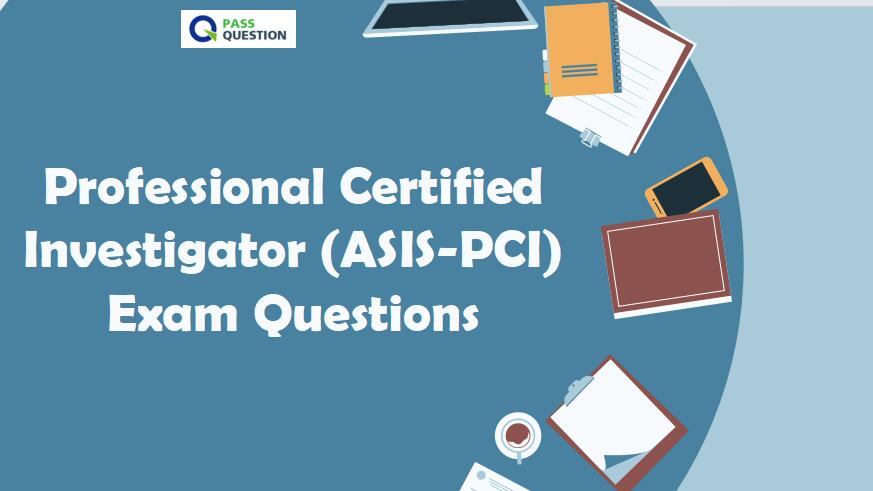Professional Certified Investigator (ASIS-PCI) Exam Questions
If you're gearing up for the Professional Certified Investigator (ASIS-PCI) exam, the latest Professional Certified Investigator (ASIS-PCI) Exam Questions from PassQuestion can be your ultimate resource. These questions are designed to fully prepare candidates for the final exam, ensuring a deep understanding of key concepts and practical skills. By utilizing these up-to-date Professional Certified Investigator (ASIS-PCI) Exam Questions, you'll be able to confidently tackle the PCI exam and boost your chances of success. With the latest Professional Certified Investigator (ASIS-PCI) Exam Questions from PassQuestion, your journey to passing the PCI exam will be smooth and well-supported, giving you the confidence needed to excel.

Professional Certified Investigator (PCI) Credential
The Professional Certified Investigator (PCI) credential is a prestigious certification designed for security professionals looking to validate their specialized investigative skills. Earning this credential is an excellent career advancement tool, providing demonstrable proof of your expertise in areas such as professional responsibility, investigative techniques, and case presentation.
The PCI certification is especially important for those with three to five years of investigative experience, including at least two years in case management. It confirms your ability to conduct thorough security investigations, manage cases effectively, and present findings in a professional manner. The exam comprises 125 scored multiple-choice questions along with 15 unscored questions, making thorough preparation crucial to success.
Why Earn the PCI Designation?
Earning the PCI designation offers a wealth of benefits, including:
Validation of Expertise: It confirms your knowledge and proficiency in security investigations.
Global Recognition: Achieving this certification earns you recognition among peers and the broader security industry.
Competitive Edge: The PCI gives you an advantage in the marketplace, positioning you as a specialist in investigative procedures.
Career and Earnings Potential: The certification enhances your qualifications, potentially opening doors for promotions and salary increases.
Personal Satisfaction: It brings both professional achievement and personal fulfillment in knowing you’ve mastered your craft.
PCI Exam Domains and Tasks
The PCI exam is broken down into three major domains: Professional Responsibility, Investigative Techniques and Procedures, and Case Presentation. Each domain covers specific tasks, and mastery of these areas is critical to passing the exam.
Professional Responsibility (28%)
TASK 1: Analyze case for applicable ethical conflicts
TASK 2: Assess case elements, strategies, and risks
TASK 3: Determine investigative goals and develop strategy
TASK 4: Determine and manage investigative resources
TASK 5: Identify, evaluate, and implement investigative process improvements.
Investigative Techniques and Procedures (52%)
TASK 1: Conduct surveillance by physical, behavioral, and electronic means.
TASK 2: Conduct interviews of individuals.
TASK 3: Collect and preserve evidence
TASK 4: Conduct research by physical, digital, and electronic means.
TASK 5: Collaborate with and obtain information from other agencies and organizations.
TASK 6: Use investigative techniques.
Case Presentation (20%)
TASK 1: Prepare report to substantiate investigative findings
TASK 2: Prepare and present testimony
View Online Professional Certified Investigator (ASIS-PCI) Free Questions
1. What is the purpose of link analysis?
A.Trace malicious software to its creator in criminal exploits
B.Identify interconnections between people, places, and activities
C.Track illegal money from Inception of criminal activity until it is laundered
D.Examine suspects in an investigation to determine who committed the illegal act
Answer: B
2. Which of the following can be used to mark property that has been stolen and later recovered so its rightful owner can be identified?
A.Cyanoacrylate fuming compound
B.Exploding dye pack
C.Magnetic print powder
D.Invisible evidence marker
Answer: D
3. Al MINIMUM which of the following digital devices should an investigation unit have at their disposal?
A.Radio frequency (RF) blocking bag
B.Separate digital recorder and camera
C.Global Positioning System (GPS) trackers
D.Personal smart phone for recordings and photographs
Answer: B
4. Which step of the intelligence collection cycle includes activities such as determining how the intelligence can be best used?
A.Evaluation
B.Requirements
C.Dissemination
D.Integration & Analysis
Answer: D
5. Which of the following is considered to be incorrect procedure when seizing a computer to obtain evidence?
A.Examining hard drive
B.Using software 10 back up the computer files
C.Turning the computer on
D.Isolating power or phone lines
Answer: C
6. What should be done to capitalize on memories and evidence in an investigation?
A.Open and complete an investigation as soon as possible, but avoid closing prematurely
B.immediately obtain audio recordings of the interviews with those that have first hand knowledge
C.Ask interviewer to rationalize their thoughts to make sure what they are telling you makes sense
D.Use new bags to collect and store all investigation findings to ensure there is no contamination
Answer : A
7. What is the primary goal of a compliance investigation?
A.Main sufficient evidence to prosecute white-collar criminals within the corporation
B.provide the corporation with audit findings
C.provide guidance to the corporation regarding possible violations of regulatory requirements
D.provide government agencies with the corporation's compliance audit findings
Answer: C
8. An undercover investigation has yielded enough information to allow the operative to be removed. What is the correct procedure m removing the operative?
A.The operative should be removed with a plausible explanation, preferably when named as an offender
B.The operative should be removed prior to any Interviews taking place with suspected offenders
C.The operative should never remain in place even If their cover story has not been compromised.
D.The operative should be removed as soon as possible
Answer: A
9. Primary reasons to protect investigative information include the potential for all of the following EXCEPT:
A.damage to the careers of witnesses
B.significant civil liability.
C.damage to important relationships with other agencies or companies
D.damage to the reputation of previously convicted individuals
Answer: D
10. Which of the following is recommended for the security professional when testifying?
A. Avoid pretrial contact with physical evidence since it could be considered tampering
B. Ask to speak to the legal counselor if the security professional does not know the answer.
C. Answer only the question that is asked
D. Only answer questions asked in advance
Answer: C